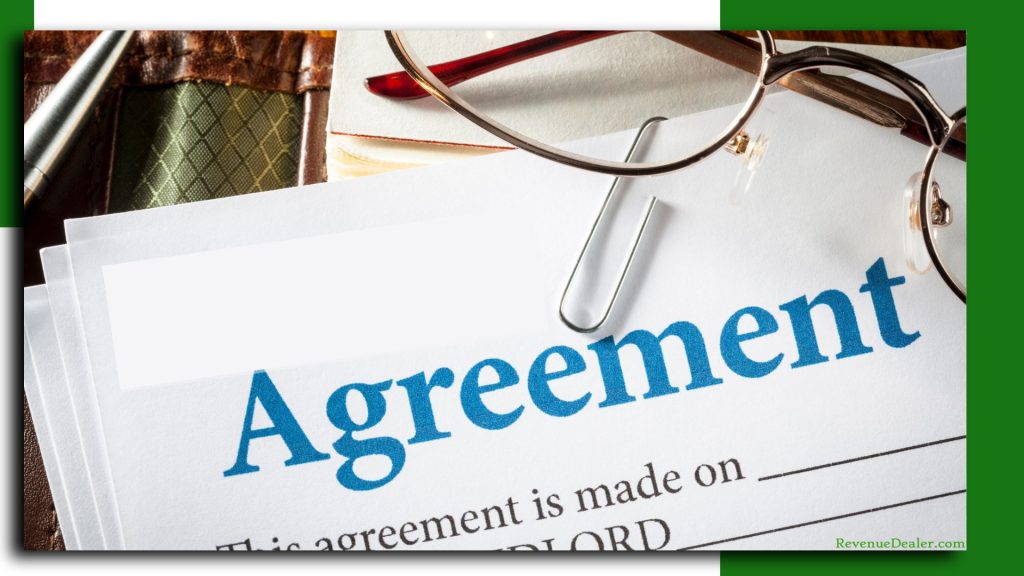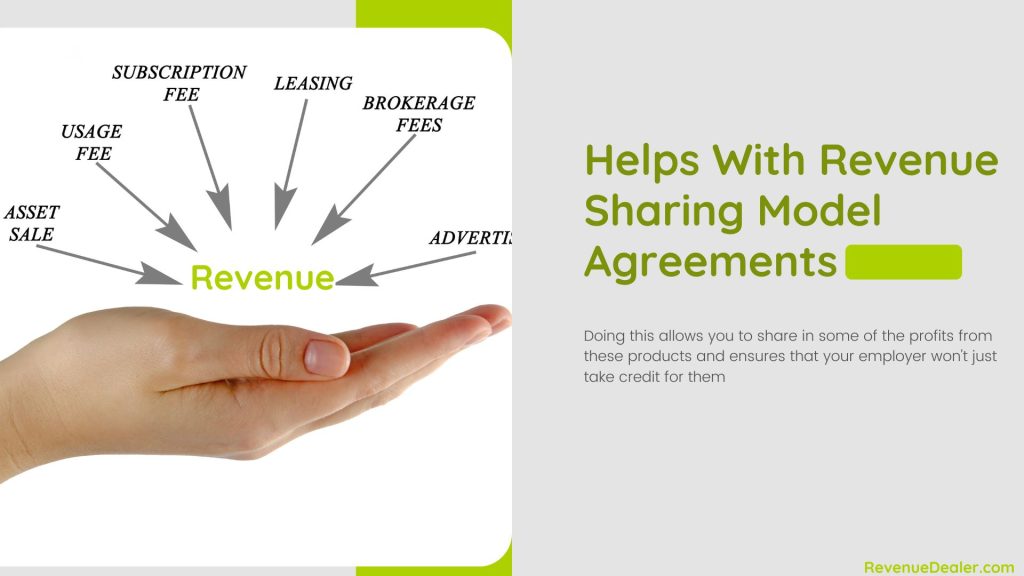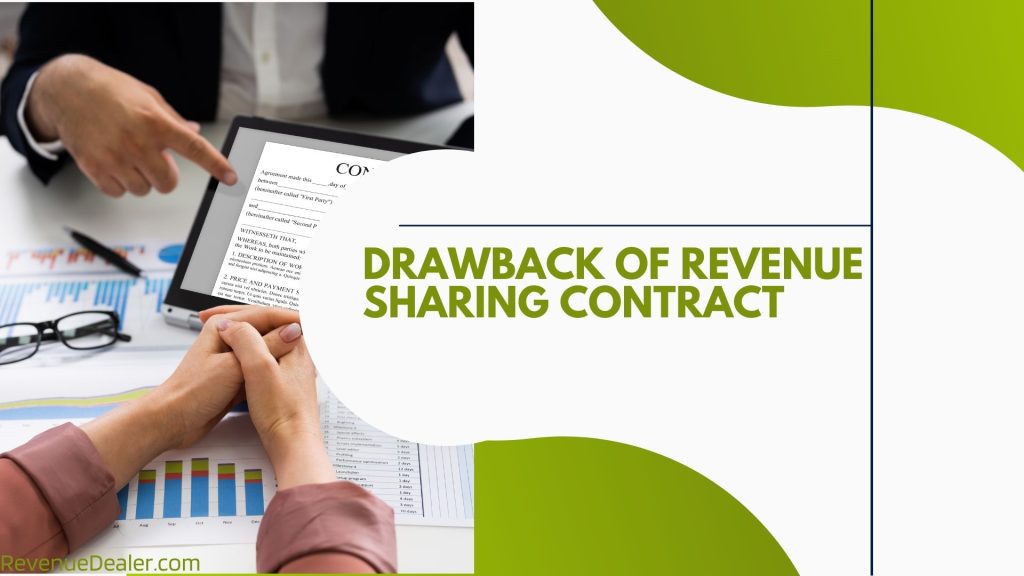

Do you want to grow your business but have less knowledge or even no idea about revenue sharing? If so, no worries because the Revenue dealer is here to guide you on everything related to the Revenue sharing model agreement.
Having a right and enough knowledge related to the Revenue sharing model agreement before signing a contract is vital. So you can’t be fooled or exploited by your partner. So let’s begin this guide without wasting a single second from the very beginning.

A revenue sharing agreement, or RSA, is an arrangement where two companies work together to share the profit of a business venture. This can be a win-win situation, but it’s important to understand how it works before choosing this option.
The most common way for companies to enter into an RSA is by forming a joint venture and splitting profits from that venture. In some cases, one company might be able to provide all the money needed for the experience while the other provides a service or product vital to it. In this case, both parties would share any profits equally.
A company can also enter into an RSA with another company with a similar product or service. Still, fewer resources than they do—in these instances, the smaller company may offer its services for free in exchange for part of the profits from sales made by the larger one.

If you’re thinking about starting a business, one of the first things you should do is draw up a revenue-sharing agreement. A revenue-sharing deal is a contract between two parties to share profits from the business. It lays out how much of the profits each party will receive and what happens if one of them doesn’t fulfill their obligations.
It’s important to have a revenue-sharing agreement in place before you start your business venture because it helps protect both parties’ interests by making clear what they can expect from each other and in what circumstances they’ll be able to get out of the deal.
Revenue sharing agreements are especially useful when one party has more experience or expertise than the other, often when an entrepreneur hires someone else to help run their company.
If either party feels like they aren’t getting enough of a share of the profits, they can renegotiate their contract at any time—and this is something that should also be built into your initial agreement.
In recent years, revenue-sharing agreements have become more popular and are used more frequently in many industries. This is because they provide benefits to both parties involved in the contract.
For example, if you’re an employee who has created a new product for your company and wants to share in its success, you may want to negotiate a revenue-sharing agreement with your employer. In this case, you could intervene 20% of all sales revenue for products you’ve created or developed while working at the company.
Doing this allows you to share in some of the profits from these products and ensures that your employer won’t just take credit for them (and possibly use them without giving you any compensation).

There are a few different ways to account for revenue shares when working with a revenue share agreement.
The first way to do it is by using an average cost-plus approach. This method involves the costs of producing the product being averaged out. And added to the total revenue generated by the product. Then, that number is divided by the number of units sold. That’s how much money each party gets.
The second method is called “markup.” This method uses predetermined percentages to determine how much money each party gets from sales. The predetermined rates can be based on any factors. But usually, they’re based on market research or similar factors that affect prices in the marketplace.
The key here is that both parties agree on these percentages before deciding. Preventing disagreements about who should get what share of the revenue from sales.

As a Start-up company, you may be asked to work for another business or organization. If this other company isn’t willing to pay you at the start of your project. They’ll ask that you agree to share some of your future revenue.
This can be difficult if the other party isn’t upfront about their financials. And how much money they make from their products or services. To protect themselves in this situation. Both parties must clearly understand what will be included in such an agreement before signing it. Here are some key points that should be included in any revenue share agreement between two companies:
In most cases, the parties to a revenue share agreement will be two parties: you and your client. However, in some rare cases, you may find that your client has multiple customers or partners. Who contribute to the project and therefore receive their share of the proceeds.
In this case, you should include as many parties as necessary for all involved parties to be represented by someone with whom they can negotiate if there is any dispute concerning the payment.
Make sure that every party’s identity, role, and responsibilities are clear. So there is no confusion about who is responsible for what part of the project or how much they should receive in return.
The first thing to decide is what revenues are being shared. The parties should be clear on what they mean by “revenue” and whether it includes only direct or indirect payments resulting from the product’s sales (for example, a producer who uses the music in their advertising).
Once you have established what constitutes a reasonable rate, you can determine how your measurement method will work. This will depend upon the type of product or service being sold and its method of distribution.
For example, if it’s an album that consumers download from iTunes or Amazon Music. Then recording artists generally get paid on a per-song basis. But if it’s an album sold as part of some other package—like at Target stores. Then recording artists usually get paid based on wholesale prices for each unit sold through those retailers’ stores (often referred to as “ROW” sales).
The agreement should explain how revenue will be shared. The two parties may agree on a fixed percentage of revenue each party will receive or decide on a fixed dollar amount for each unit sold.
For example, if you and your client agree that 30 percent of all sales will go to you and 70 percent will go to them. Then once you sell $1 million worth of products using their brand name and logos. The client would receive $700k, and you would receive $300k.
In addition to explaining how the money is calculated at the end of each project phase (or when the project ends). It’s also important that your contract include information about:
If there is a breach of contract, what are the consequences of that breach? In general, a breach of contract occurs when one party fails to perform according to its terms. The other party can then seek damages from that breaching party.
However, it’s important to note that not every failure to fulfill promises will result in an automatic breach of contract. Sometimes, circumstances beyond control may prevent someone from complying with their obligations.
For an act or omission to be considered a breach, it must be intentional and unjustifiable (not excusable). A court will likely determine whether or not something constituted a true “breach” by looking at all relevant factors surrounding each situation, including how much time was left before the performance was due.
Whether any steps could have been taken beforehand; whether there were indications ahead that performance would be difficult; etcetera.
Get a clear revenue share agreement in writing before you start working with someone else, or you could have trouble.

Revenue sharing agreements are common in many businesses but can be confusing. You might not know who to ask for help with a revenue-sharing understanding. Here are some helpful tips on who to consult when you need assistance:
Legal counsel: If you have a large company or are working with an outside party on the agreement. You should consult your legal counsel. They can help ensure everything is in order and explain how it will affect your business.
Accountant/bookkeeper: If you are looking for someone local to help you understand the financial impact of a revenue-sharing agreement. You might want to contact an accountant or bookkeeper in your area. They may be able to assist with the math involved and help explain how much money will be coming into the business each month if this agreement goes through as planned.

The main drawback of a revenue-sharing contract is that it can be more difficult to prepare for than other kinds of contracts.
For example, suppose you’re selling a product and signing a contract with someone who will manufacture that product for you. In that case, the two parties will generally have similar interests: making sure the product gets made and sold. In this case, there’s not much room for negotiation or disagreement since both parties work together towards the same goal.
But in a revenue-sharing contract, both sides contribute something different to the project—one is creating and producing something while the other is providing funding. This means that each party has different priorities to consider when negotiating terms.
It also means that both sides may not be fully aware of what they’re getting into when they first start working together. So it can be harder to predict how everything will go down once production starts or if anything goes wrong along the way (like an unexpected delay).
The key takeaway from this article is that you should be wary of making a revenue-sharing model agreement without understanding how it works and how much money you will receive.
Make sure to include all the terms in writing. So there are no misunderstandings between parties regarding what they agree to. If you don’t have an attorney review your document before signing. Consider hiring one who can help draft some language that works well for everyone involved while protecting both parties interests.
If you still have any confusion related to the Revenue sharing model agreement, contact our (Revenue Dealer) experts. They will help you get to know everything related to your Revenue share agreement. So you can start growing with us within no time.